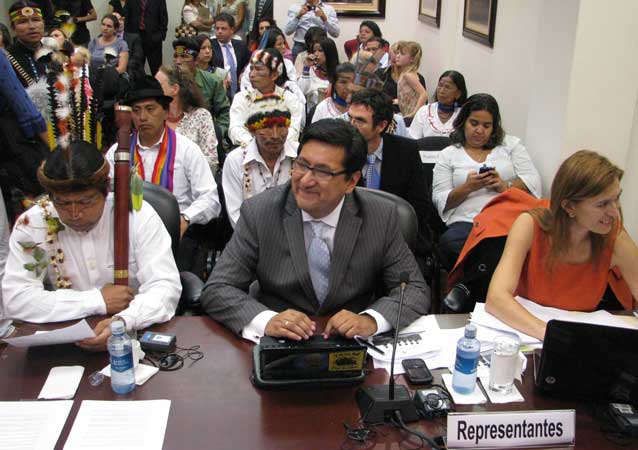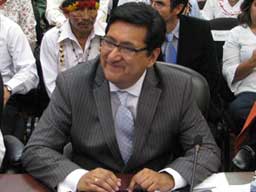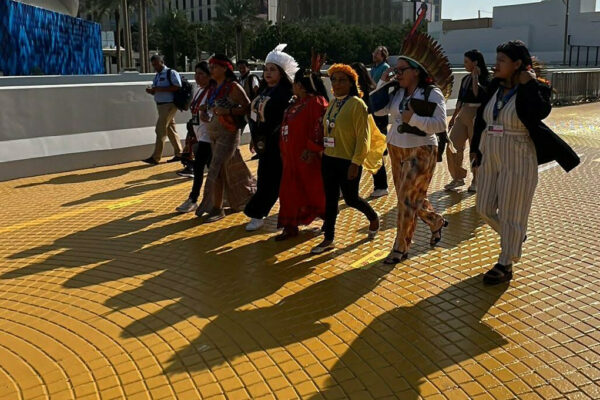
From my point of view, the following issues, among others entailed in the ruling, add relevance to the rights of indigenous peoples because:
-
After almost a decade of litigation (from 2003 to 2010 in the Inter-American Commission, and from 2010 to 2012 in the Inter-American Court), the international justice system has ruled in favor and agreed with an indigenous nation from the Amazon, who like other indigenous peoples of the world, saw its territory, life and culture threatened because the State imposed an oil project in their habitat without having previously informed or consulted, let alone reached a consent. The imposed oil activity meant for Sarayaku the militarization of their territory, environmental destruction, violence, persecution, aggressions, and even the deterioration of sacred elements of their culture and cosmology.
The wisdom of Sarayaku was in understanding that what happened to them in 2002, 2003 and 2004, was happening in response to a network of powerful transnational interests that could not be confronted solely through local resistance; in order to show the abuses and generate discussions locally and internationally, it required instead new strategies founded on International Human Rights Instruments.
Sarayaku was able to build a network of allies with whom they launched and sustained a legal process in the Inter-American System of Human Rights. This process was completely foreign to them; however they learned to work with it, and carried it with dignity.
To tell their truth, the people of Sarayaku had to leave their community in the Pastaza rainforest and travel to the Interamerican Comission of Human Rights in Washington DC and the Interamerican Court of Human Rights headquartered in San José, Costa Rica. Throughout the years, they had to overcome many obstacles and difficulties, however they never gave into fear, fatigue, pressure or false offers.
The litigation process was always rough. The State, beyond being ideologically symbolized by the four presidents that governed during these years, maintained an intransigent position by denying the facts and responsibilities. Those representing the State, felt no obligation to consult Sarayaku, but only their right to exploit petroleum and guard the indigenous territory with armed personnel. Many times, the defense of the State was to denigrate, discredit and accuse the people of Sarayaku of being delinquents, violent and even calling them “a stick in the wheel of development.”
Recently, in April 2012, only a few months before the sentencing, did the National Government recognize its responsibility, even though the attacks and the verbal disqualifications did not cease.
The favorable sentencing for Sarayaku is the product of a large effort by the people of their community, who were active protagonists and participants throughout the entirety of the process. This is reason enough to value the sentencing as a milestone in the fight to reclaim the rights of indigenous peoples in an ever-globalizing world.
-
From a legal standpoint, the sentencing addresses several important topics. The first one is the way it develops the right to a free, prior and informed consultation of the indigenous peoples, and the standards for its application. At this point in history, when several Latin-American countries are shaken by socio-environmental conflicts in which indigenous peoples claim the failure to observe their consultation right – which in itself impacts the violation of other rights – the sentencing of the Sarayaku case makes a capital contribution because it is a binding sentence for the Ecuadorian State, and sets a mandatory precedent for the countries in the OAS.
The court has been very clear and reiterative regarding the consultation process; they have repeatedly conveyed that consultations should be conducted in good faith following appropriate cultural procedures and must aim to reach an agreement (paragraph 177 of the sentencing). They also clarify that consultation does not constitute a mere formality, instead it should be conceived as a “true instrument of participation”, “responding to the ultimate goal of establishing a dialogue between the parties based on principles of mutual trust and respect, and with the view to reaching consensus between them.” (Paragraph 186 of the sentencing)
To guarantee this does not happen again, the sentencing prescribes that in the eventual case of other activities, projects exploring or extracting natural resources or development or investment plans of any other nature that could have implications impacting the Sarayaku territory, essential aspects of the Sarayaku cosmology, life and cultural identity, the Sarayaku people should be previously consulted in an appropriate and effective way, according to the international standards applicable.
The standard regarding the need to obtain consent of indigenous peoples has already been established by the Inter-American Court in the sentencing of the case Saramaka v. Surinam, in which the court said that whenever large-scale development or investment plans have a significant impact within indigenous territory, the State has the obligation to consult, but also to obtain free, prior and informed consent, respecting their culture and traditions.
Consequently, by dictating prior consultation in accordance to international standards, the Saramaka case acts as a legal precedent for the sentencing of Sarayaku.
The Sarayaku sentencing constitutes a significant contribution to a more profound safeguard of indigenous peoples’ rights and it is an example of dignity that will surely inspire many other nations and peoples around the world.














